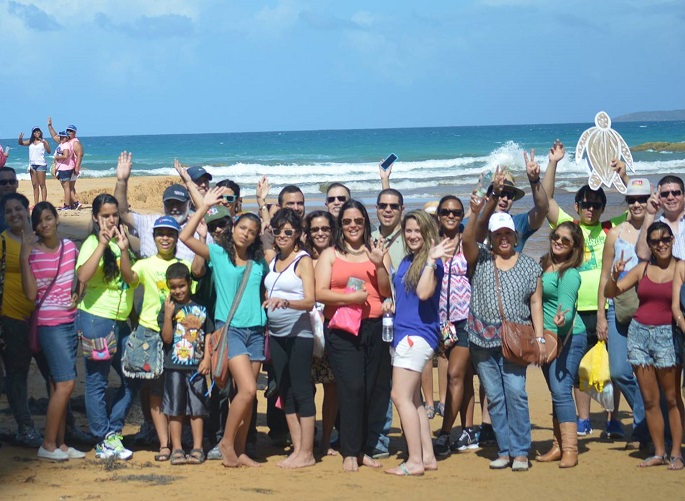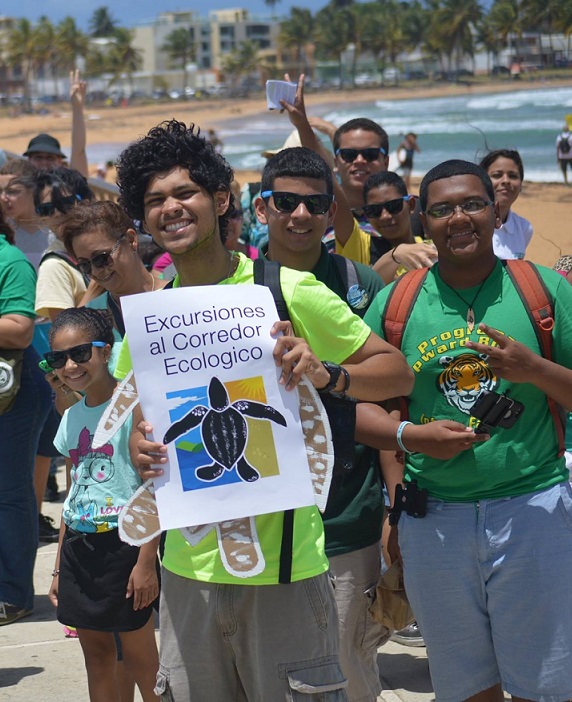Last month, over 25,000 people converged on the Puerto Rican town of Luquillo for the 10th annual Festival del Tinglar, or “Leatherback Turtle Festival.” Organized by the Coalition for the Northeast Ecological Corridor, of which the Puerto Rico Sierra Club is a key partner, the Leatherback Festival celebrates and educates people about Puerto Rico’s Northest Ecological Corridor and its nesting leatherback sea turtles. This year was the biggest-ever turnout, both from members of the public and from the volunteers who help to make the festival happen.
The Northeast Ecological Corridor is an incredibly biodiverse tract of land covering nearly 3,000 acres of lowland tropical forest, mangroves, wetlands, sandy beaches, seagrass beds, and coral reefs. The Corridor stretches over five miles of undeveloped beach, from Luquillo to Fajardo, and not only serves as a beloved “backyard” for thousands of locals, but also is one of only two sites in the Caribbean where endangered leatherback sea turtles come on land to nest. The largest of all turtles, leatherbacks lay their eggs on the Corridor’s beaches from March until July. A few months later, the babies hatch and crawl back to the sea.
Only a few years ago, the Northeast Ecological Corridor’s status as one of the last remaining tracts of undeveloped coastline in Puerto Rico was under threat. Resort developers wanted to buy up the land and build hotels, a plan that would have both social and environmental consequences.
Festivals are extremely popular in Puerto Rico, with almost every municipality hosting its own suite of celebrations. So when the Northeast Corridor Coalition and the Sierra Club needed to rally public support for protecting the Northeast Corridor, they came up with the Leatherback Festival as a solution. Leatherbacks are large, distinctive, charismatic, and rare, making them a perfect symbol of the Northeast Corridor’s ecology. Starting as a focus for petitioning and campaigning for the protection of the Corridor, the early Festival del Tinglar centered around the people who lived in surrounding communities. It often culminated with attendees taking petitions to legislative offices.
Then, in 2013, during the 8th festival, the governor of Puerto Rico signed a law that protected the Northeast Ecological Corridor from future development. Since that tremendous victory, the Leatherback Festival has exploded in popularity, this year drawing celebrants from all over the island, as well as tourists from abroad. Many participants brought their families, and enjoyed local art, music, food, educational booths, costume parades, and plenty of turtle-themed crafts for the kids. Over 190 volunteers manned the booths and crafts and monitored the festival’s recycling stations. Also, for the first time, volunteers led some participants down into the reserve itself for an easy half-hour walk, emerging onto the beach to look for turtle tracks.
Using a festival as a tool to connect local people with their natural treasures has paid off enormously for the Puerto Rico Sierra Club, as well as for the sea turtles of the Northeast Ecological Corridor. However, work remains to be done to find out how to best manage and care for the new reserve, making sure it stays open and accessible to locals and to tourists without harming the ecosystem. To that end, the Puerto Rico Department of Natural Resources and the Northeast Corridor Coalition signed an agreement to work cooperatively to manage the Corridor.
Now that’s a reason to celebrate.

